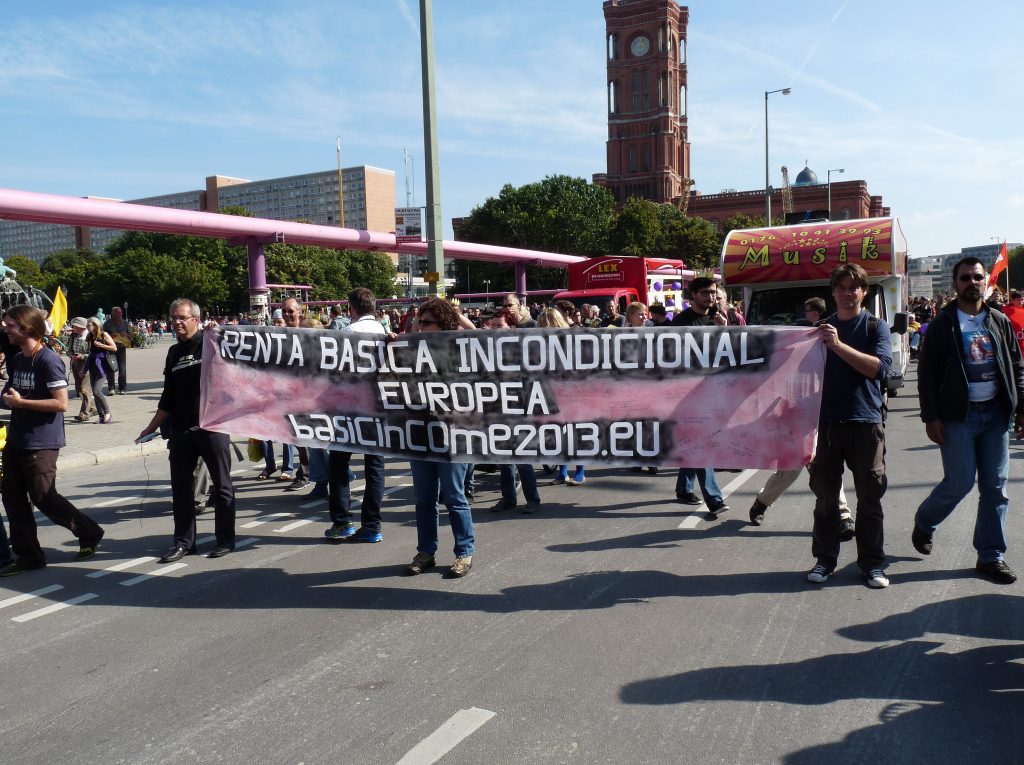Daniel Zamora has a piece in Jacobin that lays out the case against a basic income. Many have asked me to respond to the piece and so I will.
Before getting into the piece, it is worth reminding readers of what my vision of basic income is. In my proposal, the government comes to own as much capital as it can in a social wealth fund, not unlike those that already exist in Norway and Alaska. That capital will generate investment return, which will then be parceled out as a universal basic dividend (UBD) to everyone in society, every adult in society, or perhaps every working-age adult in society.
Put more generally, the idea here is that since 30 percent of national income is paid out to capital, if the state owned all that capital, the state could pay out a dividend equal to 30 percent of the average income in the country. If it owned just half of the capital, the dividend would be equal to 15 percent of the average income in the country. And so on.
Despite starting his piece off with a mention of Alaska, which uses the model I propose, Zamora never engages with the model again in his piece. Instead, he decides to take down tax-funded, welfare-state-replacing basic income schemes. Consequently, none of his critiques actually touch my proposal.
Zamora’s first argument is that it would be bad to replace the welfare state with a basic income. This is true of course, but it is not what UBD advocates say should happen.
Zamora’s second argument is that we do not have the tax capacity to pay a basic income. This is true in many European countries, though it is not actually true in the US where the tax level is very low. Nonetheless, UBD advocates do not rely on tax capacity to fund the basic income. They rely on capital income, which again is 30 percent of the national income.
Zamora’s third argument is that a basic income does not solve various problems with the labor market, such as some people having bad or no jobs and high wage inequality. This is true, but so what? It also does not eliminate militarism, cure cancer, or do a number of other important things. How is that a knock against it?
Zamora’s final argument is that a basic income does not decommodify anything, by which he means remove things from the market. This of course is true, but the case he makes on this front is also really confusing:
By the end of the nineteenth century, leftists understood this problem perfectly well. The welfare state tried to limit the areas in which the market and economic power could operate. If industrialization had made only owners full citizens with real rights, then social security and unemployment insurance established what Robert Castel called “social property,” marking “the emergence of a new function of the state, of a new form of rights, and a new conception of property.”
How does “social security and unemployment insurance” cause any more or less decommodification than basic income? Social security refers to things like disability and old-age pensions while unemployment insurance refers to income maintenance for people who lose their jobs. It is all just giving people who do not work money for them to spend in the market. You know, like basic income. Also, how is social security and unemployment insurance “a new form of rights, and a new conception of property” but basic income isn’t? In each case, you have the creation of a legal entitlement to a cash benefit.
Normally when people talk about decommodification, they do not refer to income maintenance programs, but instead to in-kind benefits like health care, education, and child care. When a state delivers those to people without charging them a user fee, this is said to decommodify them. Insofar as UBD does not seek to get rid of these in-kind benefits (or the welfare state generally), it is not really at odds with decommodification, so defined.
Lastly, even though it is ultimately irrelevant to the narrow debate at hand, allow me to indulge a bit of a tangent on the concept of decommodification. In theory, decommodification occurs when you remove something from the market, but in practice very few things that get called “decommodification” really do that.
Consider the National Health Service, for instance. The NHS is a state-owned health care system that people generally do not pay much, if any, user fee to access. It’s a great system, when properly funded, but is it really decommodified? Are the employees of the NHS not paid in cash as laborers? Are the facilities of the NHS not acquired through markets? Every single part of the NHS value chain relies upon labor and capital markets and then, at the very end of that chain, there is a consumer subsidy that brings the out-of-pocket cost to the consumer to $0. Does that subsidy at the very end really allow this service to be called decommodified?
Don’t get me wrong: I am a fan of the NHS and other ideas like it for all sorts of reasons. But I struggle to see how others are so convinced that these sorts of things are removing much of anything from markets. Growing your own food and then eating it or giving it away to someone who eats it is decommodification. Using labor and capital markets to build out educational and health systems that are free for consumers to use does not seem like decommodification, to me.

